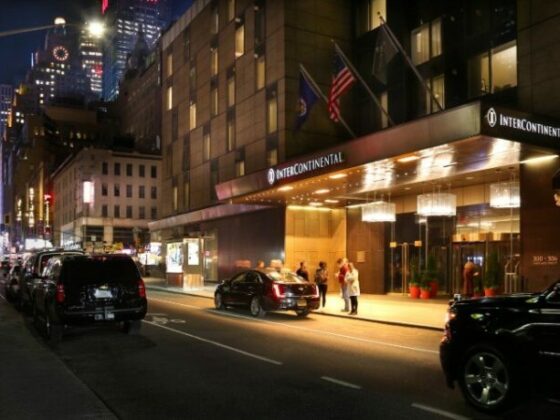
The hospitality sector is undergoing rapid growth, with the global hotel market projected to reach $5.82 trillion by 2027.[1] This expansion comes with a steep sustainability mandate: hotels must cut absolute carbon emissions by 90 percent by 2050 to align with global climate targets.[2] Meanwhile, Gen Z travelers – who value personalized experiences 2.5 times more than Baby Boomers[3] – are redefining what great hospitality looks like. In order to stay relevant and resilient, hotels must embrace innovation, but fragmentation continues to hold many operators back.
Where Most Hotels Go Wrong: Fragmentation
In my experience working with hotel developers and operators, the same pain point comes up again and again: fragmentation. One vendor manages heating, ventilation, and air conditioning (HVAC), another lighting. A separate platform tracks energy use. Guest-facing features are bolted on top, rather than integrated from the start.
The result? Inefficiencies, inconsistent experiences, and missed opportunities. A guest notices when a room feels clunky. Staff feel it when systems don’t work together. And management pays the price – both financially and in sustainability performance.
Too often, the hospitality industry treats its challenges in silos: energy consumption here, guest experience there, staff shortages somewhere else. But the truth is: hospitality is an ecosystem. Comfort, sustainability, and operational efficiency must work in harmony. Smart building technology allows hotels to connect these elements, unlocking new levels of efficiency, performance, and guest satisfaction.
Smart Hospitality in Action:
-
Guest Experience: Comfort, Control, and Personalization
Today’s travelers want it all: eco-friendly choices, comfort, simplicity, and seamless control. According to World Tourism Organization, 73 percent of guests now prefer hotels with sustainable practices[4], and over 60 percent of guests are willing to spend more on personalized experiences.[5]At the DAS EDELWEISS resort in Austria, ABB’s KNX system seamlessly integrates lighting, climate control, and shading into one platform, ensuring guests experience comfort without even thinking about it. Meanwhile, staff manage the entire building system via mobile app, from anywhere.
The Panorama Landscape Hotel in Finland exemplifies how personalized hospitality can be seamlessly enhanced through smart technology. ABB’s KNX automation elevates both energy efficiency and ambiance. Smart room control, daylight-tuned lighting, and bespoke design elements deliver a luxury guest experience that feels both high-end and highly intuitive.
-
Operational Performance: Efficiency, Reliability, and Resilience
Modern technologies optimize energy loads, enable predictive maintenance, and provide real-time insights into energy and water use – delivering up to 20 percent reductions in consumption, often more when replacing outdated systems⁵. Integration helps operators avoid downtime, simplify maintenance, and reduce operating costs – freeing staff to focus on service delivery.At Living Tomorrow’s Innovation Campus in Belgium, the future of smart hospitality is put into practice with a 92-room hotel designed as part of the campus’s showcase of sustainable smart living. ABB technologies – including KNX-based automation, intelligent energy management, and interactive guest controls – create a living demonstration of how hotels can deliver superior comfort, energy efficiency, and operational performance, all underpinned by data-driven insights and sustainable design.
-
Strategic Priorities: Long-Term Business and Sustainability Outcomes
The hospitality sector faces growing regulatory and investor demands for transparent, auditable sustainability performance. Hotels across regions representing 57 percent of global GDP are now required to report both financial and sustainability metrics[6], making integrated, data-driven infrastructure essential to achieving compliance.Electrification, automation, and intelligent infrastructure provide operators with the visibility, flexibility, and scalability needed to respond to these evolving requirements. Solutions such as ABB’s KNX system unify lighting, HVAC, and energy management – help hotels meet carbon reduction and compliance targets, while driving long-term operational efficiency and business resilience.
The Road Ahead: From Net Zero to Net Positive
Hotels are beginning to invest in regenerative practices: funding reforestation, using renewable energy, and offering sustainability experiences that guests can participate in. At the same time, data-driven sustainability reporting is becoming the norm. In 2025, new standards[7] set by the EU Corporate Sustainability Reporting Directive (CSRD) and IFRS Sustainability Standards mandate that hospitality businesses in the UK, US, Australia, Canada, Singapore, and more than 30 other countries require standardized, auditable sustainability metrics – and energy regulation is only tightening.
Electrification, building automation, and intelligent infrastructure are the backbone of hospitality leadership. Those who truly ‘get’ hospitality understand that it’s not just about tech – or people – it’s about creating a seemingly effortless guest experience, enabled by the system that connects them.
The best operators understand that long-term success depends on seamlessly connecting people, operations, and technology. As expectations rise – particularly among Gen Z travelers – the most resilient hotels are weaving smart, sustainable solutions into every part of their business. Hospitality is an ecosystem. And the operators who treat it as one will be best positioned to thrive.






